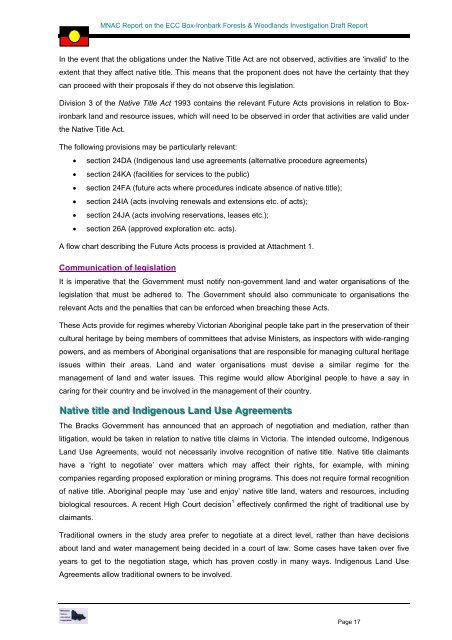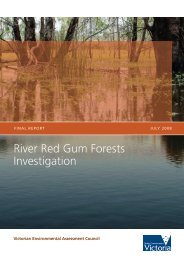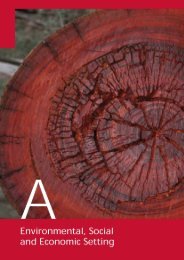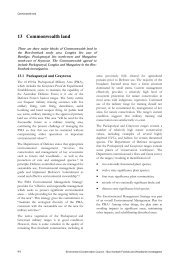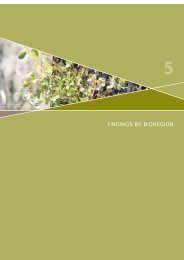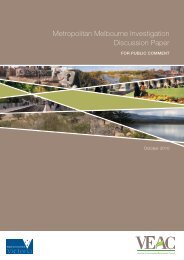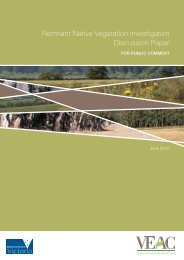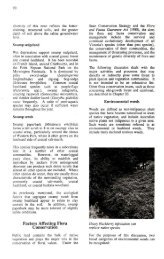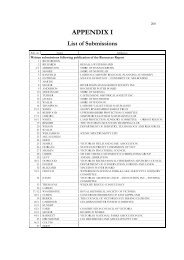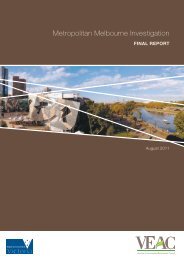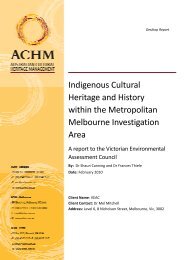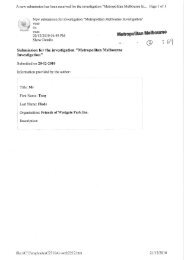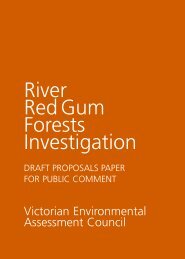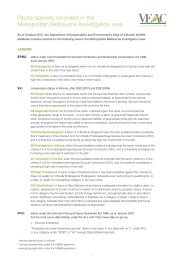Appendix 1 - Victorian Environmental Assessment Council
Appendix 1 - Victorian Environmental Assessment Council
Appendix 1 - Victorian Environmental Assessment Council
You also want an ePaper? Increase the reach of your titles
YUMPU automatically turns print PDFs into web optimized ePapers that Google loves.
MNAC Report on the ECC Box-Ironbark Forests & Woodlands Investigation Draft Report<br />
In the event that the obligations under the Native Title Act are not observed, activities are ‘invalid’ to the<br />
extent that they affect native title. This means that the proponent does not have the certainty that they<br />
can proceed with their proposals if they do not observe this legislation.<br />
Division 3 of the Native Title Act 1993 contains the relevant Future Acts provisions in relation to Boxironbark<br />
land and resource issues, which will need to be observed in order that activities are valid under<br />
the Native Title Act.<br />
The following provisions may be particularly relevant:<br />
• section 24DA (Indigenous land use agreements (alternative procedure agreements)<br />
• section 24KA (facilities for services to the public)<br />
• section 24FA (future acts where procedures indicate absence of native title);<br />
• section 24IA (acts involving renewals and extensions etc. of acts);<br />
• section 24JA (acts involving reservations, leases etc.);<br />
• section 26A (approved exploration etc. acts).<br />
A flow chart describing the Future Acts process is provided at Attachment 1.<br />
Communication of legislation<br />
It is imperative that the Government must notify non-government land and water organisations of the<br />
legislation that must be adhered to. The Government should also communicate to organisations the<br />
relevant Acts and the penalties that can be enforced when breaching these Acts.<br />
These Acts provide for regimes whereby <strong>Victorian</strong> Aboriginal people take part in the preservation of their<br />
cultural heritage by being members of committees that advise Ministers, as inspectors with wide-ranging<br />
powers, and as members of Aboriginal organisations that are responsible for managing cultural heritage<br />
issues within their areas. Land and water organisations must devise a similar regime for the<br />
management of land and water issues. This regime would allow Aboriginal people to have a say in<br />
caring for their country and be involved in the management of their country.<br />
Natti ive<br />
tti ittl le and Indi I igenous Land Use Agrreementts<br />
The Bracks Government has announced that an approach of negotiation and mediation, rather than<br />
litigation, would be taken in relation to native title claims in Victoria. The intended outcome, Indigenous<br />
Land Use Agreements, would not necessarily involve recognition of native title. Native title claimants<br />
have a ‘right to negotiate’ over matters which may affect their rights, for example, with mining<br />
companies regarding proposed exploration or mining programs. This does not require formal recognition<br />
of native title. Aboriginal people may ‘use and enjoy’ native title land, waters and resources, including<br />
biological resources. A recent High Court decision 1 effectively confirmed the right of traditional use by<br />
claimants.<br />
Traditional owners in the study area prefer to negotiate at a direct level, rather than have decisions<br />
about land and water management being decided in a court of law. Some cases have taken over five<br />
years to get to the negotiation stage, which has proven costly in many ways. Indigenous Land Use<br />
Agreements allow traditional owners to be involved.<br />
Page 17


